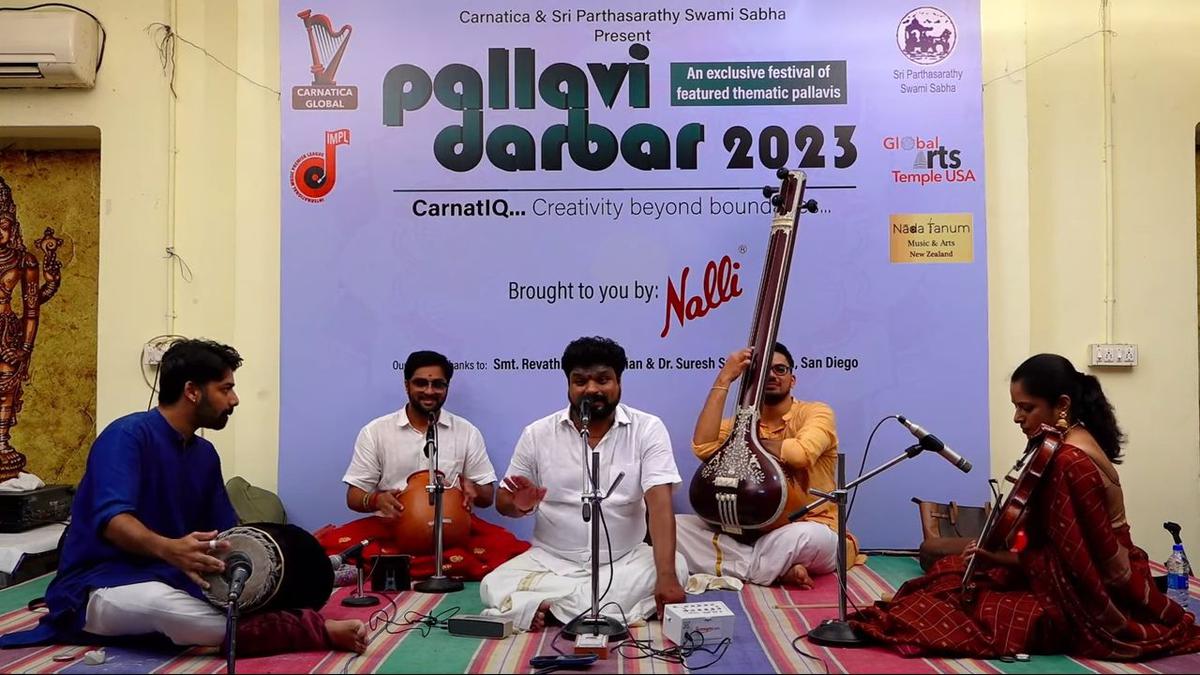
Kunnakudi Balamurali Krishna’s pure Pallavi concert showed his skills in music and math
The Hindu
A concert that blended music and math
Kunnakudi Balamurali Krishna has had a steady rise to the top tier of performers through hard work and overcoming some obstacles admirably. In that journey, he has sharpened his aesthetic underpinning, as was demonstrated at the Pallavi Darbar concert series jointly organised by Carnatica and Sri Parathasarathy Swami Sabha. He and violinist Akkarai Subhalakshmi packed a volley of melodies in the Vasantha raga-based Ragam Tanam Pallavi.
The performers took it as two exams — a language exam (musical language) and a mathematics exam (Pallavi part). ‘Mokshamu galada’ (raga Saramati by Tyagaraja) was a warm-up piece which captured the mood of the song well. Vasantha has many shades of emotional linings around the madhyamam, nishadam, and generally at the higher notes. Balamuralikrishna through his deep voice usage at the lower notes added more beauty and demonstrated a rare skill of reaching the gandharam of the lower octave sustainably. His impeccable sruthi and softer modulations helped him paint an attractive picture of Vasantha. In doing so, he eschewed jarring or loud notes by and large. The raga alapana kalapramanam allowed more karvais and soft note landings for enhancement. Akkarai Subhalakshmi’s tanam had an arresting course with the MSG brand of resonance. She stuck to a conformist path in the alapana. The tanam segment was embellished by both Balamuralikrishna and Subhalakshmi and for a good 25 minutes that fortified their manodharma claims.
Balamuralikrishna added surprising tanams in Neelambari, Ahiri and Varali (not sure of the linkages they have) so as to balance the eka-raga monotony and provide some contrast. The Pallavi started off with a two-mark question and went on to tougher terrains. The start was a simpler four-kalai Pallavi in Adi talam with athetha eduppu (before samam). The words were ‘Thir arul padam perave arul padam perave padam perave; vegamai paadum paniyai enakku arulvaai’. One presumes the ‘vegamaai’ is an adverb to the ‘arulvaai’ than ‘paadum paniyai’! Another striking feature of Balamuralikrishna’s singing is that the raga swaroopam stays true in all forms of manodharma, including when he unleashed alternative tala structures in this concert later.
A brief conventional niraval in two speeds led to the second exam — mathematics. Balamuralikrishna carved out two tala assemblies within the 64 count — a khanda-tisra combo replacing chatusra; and a more complex pancha nadai structure based on an ‘ata’ tala layer. His singing of the Pallavi in these two rejigged tala structures showcased his amazing talent in this area as well. The ordinary listener may have been left behind in this passage as the singing sounds the same even though the hand-beats were different. Some realignment of the words of course was cleverly done by Balamuralikrishna. Such rearrangement of a Pallavi into a new mix of calculations is one of our music’s great intellectual stimuli. The audience may not enjoy it as much as musicians do. Given the nature of the concert series, such indulgence was to be expected.
Balamuralikrishna’s trikalam in a multi-nadai format was also competently accomplished. Balancing pleasant singing with challenging mathematical formations is a rare trait that he possesses and will probably use them judiciously, as the average audience may skip the math paper.
Akkarai Subhalakshmi had a limited role in the Pallavi phase due to the demo nature of it. Sumesh Narayanan and Chandrasekara Sharma were padded up for a full hour before they could bat. Their Pallavi accompaniment was well-aligned and the tani had to be squeezed to a standard fare due to paucity of time. It would have been a good fit if the tani also had multi-nadai sequences.
A pure Pallavi concert certainly serves to raise the knowledge standards of an important element of our music. I also got educated on how to compose problems whose answer is 64!













